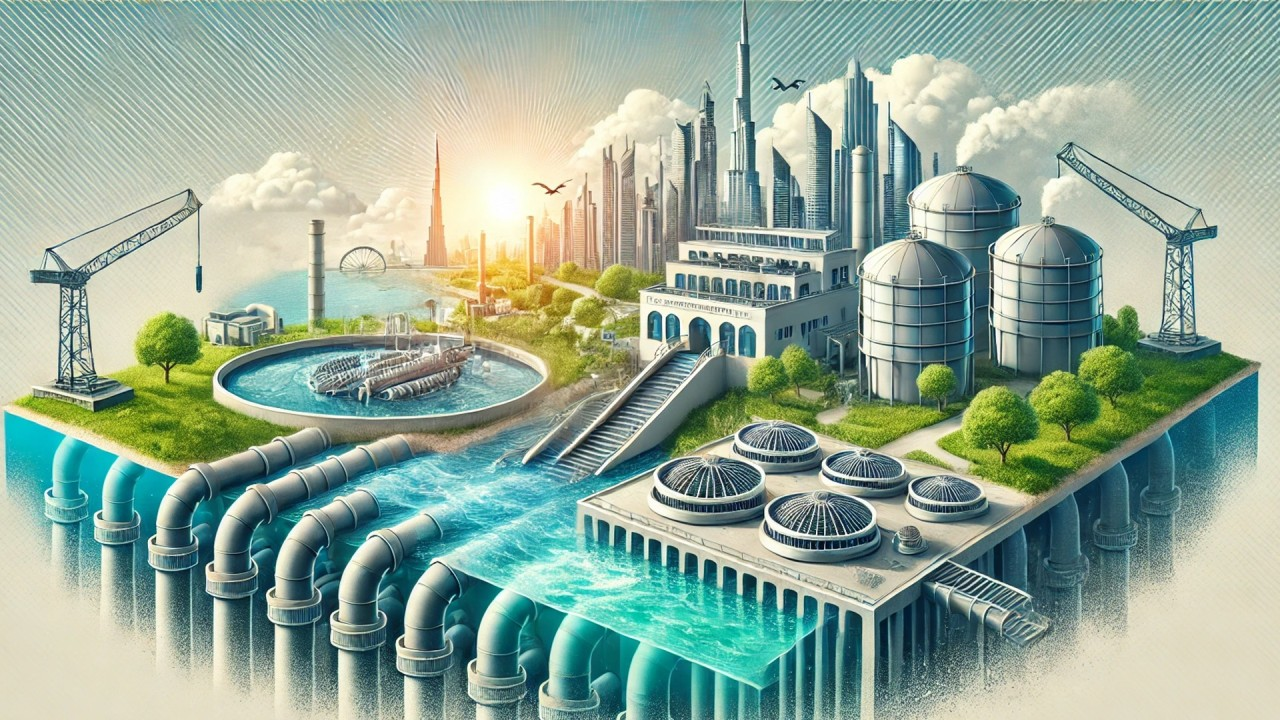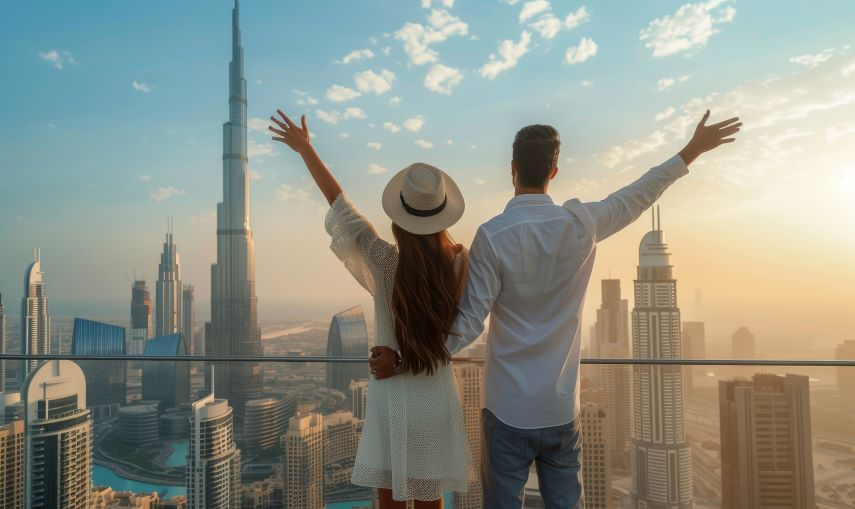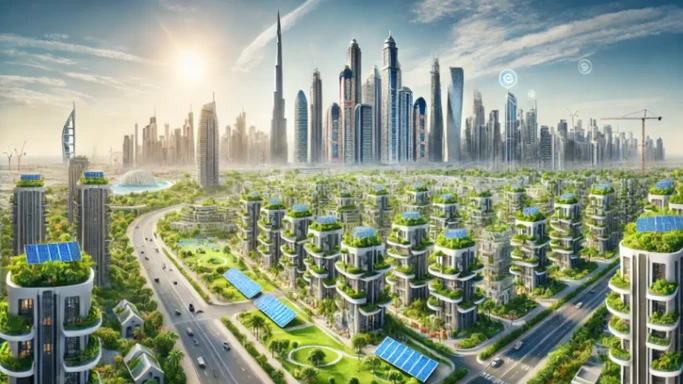
Dubai, a city once known mainly for its towering skyscrapers, luxurious lifestyle, and rapid development, is now stepping confidently into a greener future. With climate change becoming a growing concern worldwide, Dubai has begun encouraging its citizens, businesses, and institutions to adopt sustainable habits in daily life. From eco-friendly housing to smarter transport and waste reduction, the city’s new direction is not just a government initiative it’s becoming a way of life.
This change did not happen overnight. It is the result of years of policy planning, awareness campaigns, and smart innovations. As the UAE moves toward its Net Zero by 2050 goal, Dubai has become a key player in implementing change on the ground.

One of the most visible shifts in Dubai is in its residential areas. Real estate developers are creating communities designed around sustainability. For example, Sustainable City Dubai’s flagship eco-village is built with solar panels, smart irrigation, and recycled water systems. Homes are powered by renewable energy and electric buggies replace conventional cars inside the compound.
Developments like these show that sustainable living is not just possible — it’s comfortable and efficient. Many families now seek homes in areas that support greener lifestyles, such as using less energy, reducing waste, and having access to green transport.
Another major area of improvement in Dubai is waste management. With the introduction of Dubai Can, a citywide sustainability initiative launched in 2022, single-use plastic bottles are being reduced across the emirate. The initiative includes more than 50 public water refill stations, encouraging people to carry reusable bottles.
Many residents are now separating waste into recyclable and non-recyclable categories. Communities and schools hold recycling drives regularly, and the Dubai Municipality has introduced smart bins across the city. These bins notify collection teams when they are full and help improve efficiency.
The Emirates Environmental Group (EEG), a long-standing organization in the UAE, continues to educate the public about the importance of recycling and proper waste disposal. These efforts have helped change daily habits in households and workplaces.
Dubai’s focus on sustainability is clearly visible in its transport network. Public transportation like the Dubai Metro and electric buses have become more popular with residents looking to reduce their carbon footprint. The Roads and Transport Authority (RTA) is also introducing more green vehicles and is aiming for at least 50% of its taxi fleet to be electric or hybrid by 2030.
Carpooling apps, electric scooter rentals, and bicycle-sharing services are being used more frequently, especially in busy districts like Downtown Dubai, Business Bay, and Dubai Marina. People are finding that these methods are not only eco-friendly but also cost-effective and efficient.
Charging stations for electric cars have also increased across the city. The Dubai Electricity and Water Authority (DEWA) has launched over 300 EV Green Charger stations as of 2025, making it easier for electric vehicle owners to keep moving without the worry of running out of power.
Education plays a key role in shaping habits. Dubai’s schools are now integrating sustainability into their curriculums, teaching children about recycling, energy saving, and environmental care from an early age. Many international schools have eco-clubs that hold regular activities like beach cleanups, tree planting, and sustainability competitions.
Students are also encouraged to take part in the Sustainability Champions Program, which helps young people become leaders in environmental change. The involvement of children ensures that sustainable living becomes part of the next generation’s mindset.
Sustainability in Dubai is also entering the world of fashion and retail. Consumers are more aware than ever about the environmental impact of fast fashion and are now turning to second-hand stores, thrift markets, and eco-friendly brands.
The Dubai Sustainable Fashion Movement is gaining traction, with many local designers using organic fabrics, low-waste production methods, and ethical labor practices. Events like Fashion Forward Dubai now showcase eco-conscious collections that reflect the changing tastes of the public.
On the shopping side, malls have started encouraging reusable bags, cutting down plastic packaging, and offering recycling bins for e-waste, batteries, and other difficult-to-dispose items.
Eating habits in Dubai are also shifting toward sustainability. Plant-based diets are becoming more popular, and many restaurants now offer vegetarian and vegan options as standard. Local farms using hydroponics and vertical farming are supplying fresh produce to restaurants and supermarkets, reducing the need for long-haul food imports.
The Emirates Bio Farm and Pure Harvest Smart Farms are examples of innovative solutions that reduce water use and carbon emissions, while still providing high-quality food to the market. More residents are also supporting local farmers’ markets, further boosting the local economy and cutting down on waste.

The government of Dubai continues to drive the sustainability agenda through several key policies and frameworks. The Dubai Clean Energy Strategy 2050, Dubai Net Zero Carbon Emissions Strategy, and Dubai Urban Master Plan 2040 are major roadmaps that support the city’s green goals.
In 2023, Dubai hosted COP28, a global climate conference that helped boost local awareness and attracted investments into renewable energy, carbon-reduction technologies, and green businesses.
As we step further into 2025, Dubai’s sustainability habits are not just top-down policies but community-driven actions. People are making daily choices that reflect a deepening commitment to the environment from switching off unused lights and using solar power, to saying no to plastics and biking to work.
Dubai’s sustainability journey is a strong example for other global cities. It shows that with the right policies, education, and community involvement, a luxury-focused urban center can transform into a model of responsible living. While challenges remain, the progress so far is promising and it all starts with individual habits changing one step at a time.
READ MORE:- Shobha Realty Launches Its Most Luxurious Project Yet—Full Details Inside 2025
